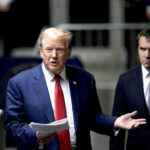A judge’s decision to allow unrelated testimony against former President Donald Trump has raised concerns about potentially biasing the jury. Legal analysts argue that the testimony of adult film actress Stephanie Clifford, also known as “Stormy Daniels,” should not have been permitted as it was unrelated to the accusations against President Trump. This move by the judge violated the principle that prosecutors should only present relevant evidence to avoid swaying the jury based on emotions rather than facts.
Despite some legal analysts seeing the trial progressing well for prosecutors, the controversy surrounding Clifford’s testimony adds to existing concerns about the handling of the case. The accusations against President Trump, related to alleged business record violations, have been questioned for their legal basis. Critics argue that the trial’s focus on hush-money payments and nondisclosure agreements could have far-reaching implications for the justice and political systems in the U.S.
The core of the case against President Trump revolves around allegations of covering up payments to Clifford to silence her about an alleged affair. Prosecutors claim that these payments were improperly classified to hide their true purpose. However, some legal experts, like Phillip Kline, believe that the accusations lack solid legal grounds.
The testimony of Jeffrey McConney, a former Trump employee, was seen as more relevant to the case compared to Clifford’s testimony. McConney’s statements regarding the reimbursements to Michael Cohen and President Trump’s involvement in the payments shed light on the core elements of the alleged crimes.
Despite differing opinions among legal analysts, the trial’s outcome could have significant implications not just for President Trump but for the rule of law and justice system in the U.S. The handling of the case and the admission of potentially irrelevant testimony have raised concerns about the fairness and integrity of the legal process. Fedden stated in an interview with MSNBC that regardless of the details of the alleged affair between Donald Trump and Ms. Clifford, the main issue at hand is whether Trump falsified business records to conceal the story, whether it is true or false.
During Ms. Clifford’s testimony in a Manhattan courtroom, President Trump, who denies the affair, was under a gag order and unable to respond. The judge fined him for violating the order with social media posts and warned of jail time for further infractions, including making intimidating facial expressions.
Despite the constitutionality of the order being disputed, Judge Merchan deemed Ms. Clifford’s testimony relevant but denied defense lawyers the opportunity to question a key witness. Law professor Jonathan Turley criticized the judge for allowing irrelevant testimony to persist, labeling it a “Dumpster fire.”
President Trump’s lawyers requested a mistrial due to statements made by Ms. Clifford, but the judge refused, citing a lack of objections. Critics, including Mr. Allen, believe the judge’s actions demonstrate bias against Trump and highlight the politicization of the court system.
As the situation unfolds, concerns about partisan motives in the legal proceedings are growing, with many expressing opposition to what they see as a misuse of the court system for political gain. Please rewrite this sentence.
Source link






